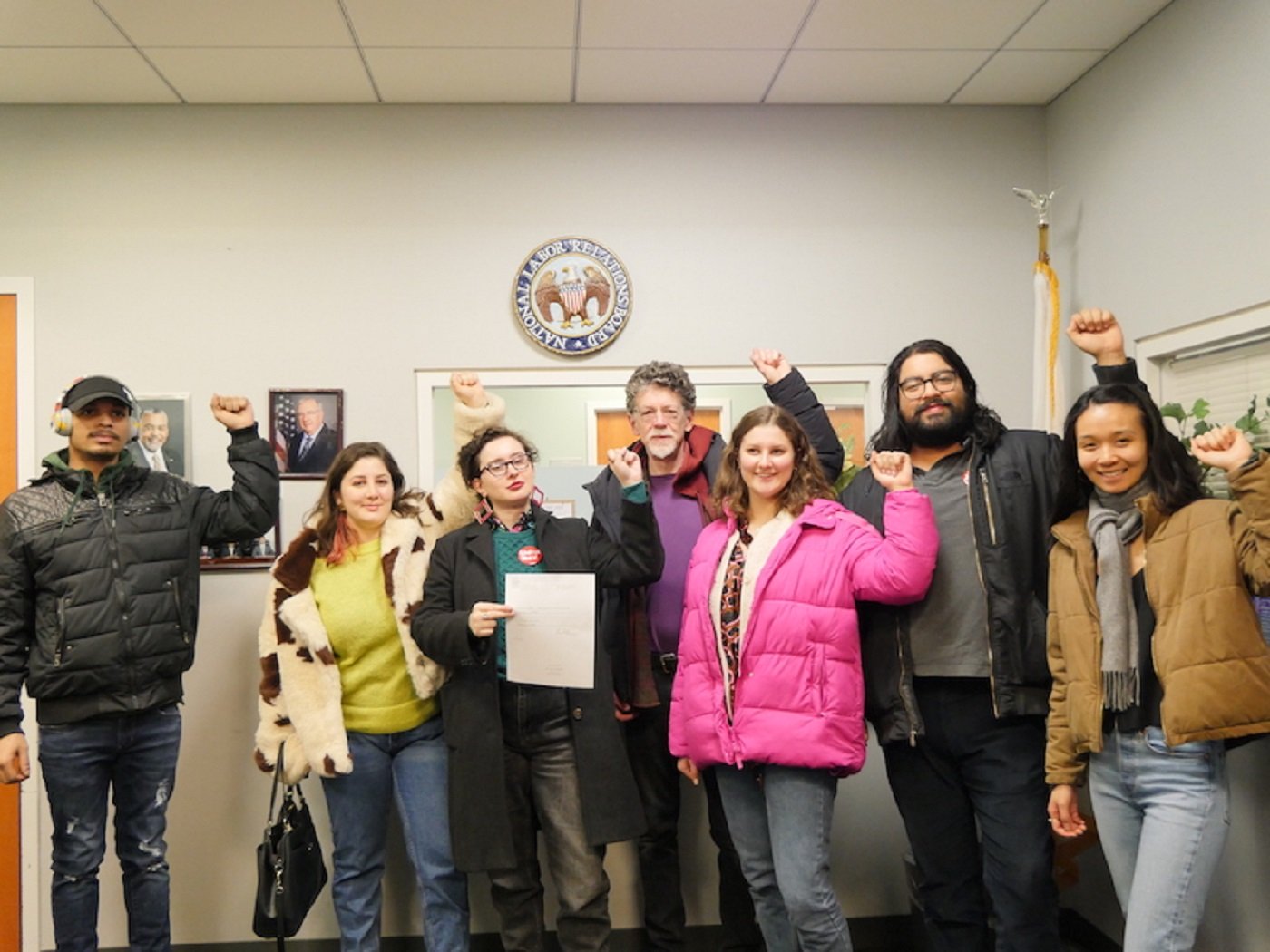
Homelessness, low wages, discrimination, harassment, and inadequate health care coverage are all things nonprofit organizations claim to fight against. But they are increasingly becoming realities for many nonprofit employees. Many workers have turned to unions to fight back.
On Feb. 14, a delegation of Housing Works employees left their offices and marched to the New York City office of the National Labor Relations Board. The workers filed for a federal union election to begin the unionizing process.
They have been working to unionize under the Retail, Wholesale and Department Store Union, but Housing Works management has refused to sign a neutrality agreement. A neutrality agreement ensures that the organization will not interfere with unionizing efforts.
The National Labor Relations Board is an independent federal agency vested with the power to safeguard employees’ rights to organize and to determine whether to have unions as their bargaining representative. An initial election would determine if the majority of employees (as a bargaining unit) want to be represented by a union. Housing Works essentially forced their employees to file for a union election with the NLRB, instead of voluntarily recognizing the union.
Housing Works is a New York City non-profit organization that serves those living with AIDS and HIV. Founded in 1990 by activists from the grass roots group ACT UP (The AIDS Coalition to Unleash Power), the agency had operating revenues of $106,823,137 in 2017. It currently offers housing, substance use, health care, legal, and employment services to its clients.
Housing Works employees, including maintenance workers, attorneys, retail workers and case managers, are seeking to unionize together as one bargaining unit to improve their working conditions. Workers say that they are experiencing high caseloads, insufficient paid time off, harassment, low wages, lack of affordable health care, high turnover rates and unsafe work environments. A majority of these workers are in favor of the union.
Employees maintain that these issues ultimately affect the client experience. Ilana Engelberg, a care manager at one of the organization’s Brooklyn facilities, stated that clients “really need to have 100 percent of our attention, but with our caseloads being as high as they are, it’s really hard to give each person the full services.”
Employee is homeless and lives in a shelter
Issues with working conditions are also starting to affect the everyday lives of staff members. Adrian Downing-Espinal, a harm reduction counselor stated, “I just had a conversation with one of my colleagues like a month ago, and he was telling me that [he was experiencing homelessness]. “He can’t come to our union meetings because he has a curfew at a shelter. It’s pretty mind blowing.”
Engelberg futher stated, “It feels very hypocritical to be working in an agency that’s supposed to end homelessness and that some of our coworkers are facing that.”
Management using intimidation tactics to counter union efforts
While Housing Works maintains that it is pro-union, they have used intimidation tactics to dissuade organizing. Management took a poll of employees who were going to participate in a previous walk out in an attempt to deter them from participating. The agency has retained Seyfarth and Shaw, a consulting firm with a history of anti-union work, to represent them in this case.
Current CEO Charles King made allegations that staff members were meeting during store hours to discuss unionizing and were harassing colleagues to sign union cards. Employees deny these allegations .
‘Worse than for-profit companies’
Stuart Appelbaum, president of RWDSU, said “Given what Housing Works is, and its history, we thought that it would be open to real dialogue with workers. Instead we have found management to be even worse than for-profit companies with which we’ve dealt.
Housing Works is just one of many non-profits that are making unionizing difficult for their employees. The Southern Poverty Law Center, a prominent nonprofit, declined to voluntarily recognize their unionizing employees last year. Like Housing Works, the SPLC claimed to be pro-union. However, they declined to voluntarily recognize a labor union, but said they would allow an election. They retained Hunton Andrews Kurth as legal counsel as a response to the union drive. HAK has a history of anti-unionizing work. The SPLC claims to seek justice for the most vulnerable members of society, but when they had the opportunity to apply that mission to their workers, they declined.
Unionizing efforts growing at non-profits
Unionizing is becoming increasingly popular with non-profit employees. Non-profit workers in DC, California, Maryland, Alabama, and New York, have helped swell the Non-profit Professional Employees Union’s ranks 30 percent over the past year. The NPEU currently represents 19 nonprofits, or 350 members.
Non-profit union growth is due to the nature of the non-profit business. Non-profit groups have long been known for a culture of unpaid hours, low salaries and thin budgets. Despite the disadvantages, employees enter non-profit work for the chance to positively impact society. The low wages and long hours are offset by the idea that you are helping the most vulnerable populations and improving the world. Unfortunately, management can use these ideals to exploit employee labor.
In non-profit organizations, women and people of color make up much of the rank and file employees. The executive employees tend to be much less diverse. As has already been widely reported, white people hold more than 80 percent of the industry’s top positions.
Unionizing is one way that non-profit organizations can implement the social justice missions they claim to champion. Unfortunately, non-profits are proving to be just as beholden to capitalist labor policies as other types of corporations.
While unions are working class organizations, and benefit all workers in their ranks, research shows that people of color, women, and women of color all benefit significantly from unionization. “A 2014 analysis by the Center for Economic and Policy Research found that Black employees earn an average of 16% higher wages that non-union Black workers, are 17 percent more likely to have employee-provided health insurance, and 18 percent more likely to have an employer-sponsored retirement plan. A 2016 study by the Institute for Women’s Policy Research found that women covered by a union contract were 26 percent more likely to receive employer provided health care and received 15–30 percent higher wages. And a 2018 analysis by the University of Berkley found that Black and Latinx workers see a bigger increase in their average wages from union coverage than White workers.”
Non-profits exhibiting capitalist anti-labor practices
Non-profit organizations have not taken kindly to this new trend toward union organizing. Much like for-profit corporations, non-profits have been antagonistic towards unions and tried to deter their progress. Kayla Blado, the president of the NPEU and a staffer at the Economic Policy Institute, said that two of NPEU’s five successful union campaigns in 2019 were particularly contentious, even at places known for their civil rights advocacy.
By declining to voluntarily recognize unions, and forcing employees to go through the NLRB, nonprofit management can slow down the unionizing process and discourage employee participation. While the mission of the NLRB is to protect worker’s rights, it has become increasingly anti worker under the current administration. Adam Obernauer, RWDSU Director of Retail Organizing told LaborPress, “The NLRB is not necessarily favorable to working people today under the Trump administration”
According to the Economic Policy Institute, “Under the Trump administration, the National Labor Relations Board (NLRB) has systematically rolled back workers’ rights to form unions and engage in collective bargaining with their employers, to the detriment of workers, their communities, and the economy.”
Capitalism and non-profits
Why would non-profit organizations, which tout themselves as more progressive than for-profit companies, be anti-union? The answer lies in capitalism and its inherent fraudulence. Non-profits in a capitalist system serve as band aids for social issues facing the labor pool. For example, you cannot maintain a labor pool if workers are suffering from starvation. You need someone to offer food to those in need, so that they can maintain their employment.
Another example of this social band aid are child welfare non-profits, for which this reporter has worked for the past seven years. Child welfare non-profits claim to work toward the safety and well-being of children and families. However, most of these organizations focus on short term solutions.. They often ignore the systemic issues that cause child abuse and neglect, and use the judicial system to police poor, Black and Latino families. Ultimately, their goal is to ensure the next generation of wage laborers make it into the workforce, and little else.
Non-profit organizations are not just an example of capitalism’s fraudulence, they are also an example of capitalism’s contradictions. Non-profits work to maintain the labor force by managing the social issues of workers. However, these issues are caused by capitalism. Hunger, homelessness, social injustice and poverty are all products of a greedy, profit-driven social system. Non-profits could eliminate these social issues by giving their funding to the poor and working class. Instead, non-profit organizations appear to be passing these issues on to their employees.





